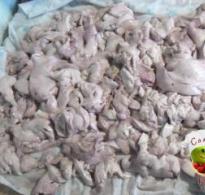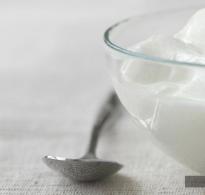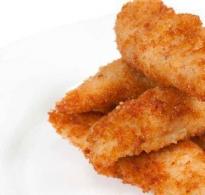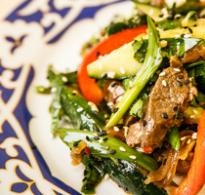Hipp tea for newborns. The benefits and harms of fennel tea
Even the strongest and healthiest babies are not immune to digestive problems that lead to colic in the first months of life. Fennel for newborns is a real salvation and safe ambulance. A natural product is able to quickly remove unpleasant symptoms, alleviating the condition of the child. Of course, it will not speed up the formation of all the processes of the digestive tract and the formation of beneficial microflora, but in combination with massage it will quickly calm the baby. You just need to learn how to brew the product and give it to the baby so that there are no allergies or other unpleasant consequences.
The mechanism of action of the product and the expected effect
Fennel is one of the relatives of the most common dill. All its parts, which have a pleasant spicy aroma, are suitable for eating and preparing medicinal decoctions. The product contains numerous vitamins, mineral components, glycosides and essential oils.
The most impressive content of substances necessary for the normalization of the child's condition is noted in the dried seeds, roots and grass of the plant. It is from them that it is best to prepare a decoction, infusion or tea for newborns. At the same time, you can use essential oil, which is added to the bath when bathing babies. This helps to relax the baby and prevent diaper rash.

During the therapy, which is based on children's fennel tea, the following happens:
- The spasm of the smooth muscles of the intestine is removed, due to which there are pronounced painful sensations.
- Eliminates excess gas. The gas bubbles burst and are expelled naturally.
- The process of digestion of food is normalized.
At the same time, the fennel drink relieves stress, calms the nervous system, and strengthens the baby's immune defenses. But, despite such pronounced positive results, it is better to coordinate such treatment with the local pediatrician.
Treatment rules and drink recipes
Although fennel for newborns is considered a safe therapy option, it must be introduced into the diet of a toddler very carefully. In case of an overdose, the infant may develop an allergic reaction in the form of an itchy rash. The product can be given to children from the second week of their life, limiting the first dose to half a teaspoon. The dose is gradually increased, reaching up to 3 teaspoons per day (1 before feeding).

Tip: Fennel is not a preventative, so don't give it to a child who doesn't suffer from colic. In some cases, this may not lead to negative consequences, but one cannot exclude the option of a kind of addiction to the product, due to which the child's digestion will be carried out without problems only if the tea is continued to be consumed.
Brewing the product is very simple, you just need to follow one of the following schemes:
- Tea. We take 2-3 g of fennel seeds, crush them in a mortar until a homogeneous powder is obtained (can be ground in a coffee grinder) and pour a glass of boiling water. We insist the product for 30-60 minutes, after which we filter through a double gauze. Add a little boiled water at room temperature so that you end up with a whole glass again.
- Decoction. 5 g of roots (fruits) of fennel finely chopped and pour a glass of boiling water. Then boil over medium heat for 2 minutes and insist under the lid for another 10 minutes. Next, filter the drink and cool to the desired temperature.
- Infusion. Grind the fennel herb and take in the amount of one tablespoon. Pour it with half a glass of boiling water, insist for an hour, after which we filter it and can give it to the baby.
- Dill water. It is prepared from the essential oil of fennel, despite its name. Translating milliliters into drops, you can seriously confuse with dosages, so it is better to initially purchase the product in finished form and store it in the refrigerator for a month. In general, 0.05 g of essential oil is used to prepare the composition, which is diluted in a liter of cooled boiled water.

It happens that an allergic response from the use of fennel appears only 4-5 days after the start of therapy. Therefore, it is not necessary at this time to introduce new products into the diet of the baby (and the nursing mother), so that there is no confusion with the cause of the reaction.
Common pharmaceutical preparations and their use in an integrated approach
Today, it is not necessary to bother with the preparation of the listed drinks, you can simply purchase ready-made children's tea or powder for preparing a medicinal solution. The greatest popularity and trust of mothers have earned products under the trademarks of Hipp, Humana, Bebivita. Instructions for preparing the compositions are on the packaging itself. Most often, recommendations come down to brewing a teaspoon or a sachet of the product in a glass of boiling water, infusing for 15-20 minutes and cooling to room temperature. The main thing is to give preference to drugs without the addition of sugar or its analogues.

To achieve the maximum effect from the treatment of colic, it is recommended to combine the use of fennel drinks with soothing baths with the addition of the same plant. In this case, the main component can be combined with other medicinal decoctions (chamomile, licorice, marshmallow root, wheatgrass, thyme, oregano). It is not necessary to carry out the manipulation daily, 1-2 times a week will be enough. The main thing is to adhere to the basic technical recommendations. We take a tablespoon of all the selected fees, pour them into one container and pour a liter of boiling water. After a couple of hours, filter the composition and add its liquid part to the water.
All fennel products, except dill water, should be given fresh to the newborn. The drink left after feeding the child can be consumed by the mother. This will allow her to improve her digestion and additionally provide the baby with useful components through breastfeeding.
There are two varieties of fennel. One of them is vegetable, its roots are used in cooking when preparing a variety of dishes. Common fennel seeds are used for brewing. This infusion helps to cope with disorders of the intestines, nervous system and gallbladder. Its beneficial properties have been known since the time of Avicenna and do not lose their relevance even in the presence of a wide range of modern medicines. To get the most out of this natural remedy, it's important to understand how to brew fennel. There are some differences in the preparation of infusion for adults and children.
Useful properties of fennel
The difference between fennel and most other medicines is the minimum of contraindications. It should not be used for epilepsy and serious heart rhythm disturbances. During pregnancy, it is also not recommended because it can lead to an increase in the tone of the uterus, and this, in turn, can cause a miscarriage. During diarrhea, fennel can aggravate the situation. In addition, allergic reactions and individual intolerance are not excluded.
As for the benefits, it consists primarily in a positive effect on the functioning of the intestines. That is why fennel is often used to treat colic in infants and eliminate various kinds of problems in adults.
The soothing effect of the seeds of this plant is also known. Their infusion is recommended for insomnia and to relieve stress in difficult life situations.
Gallbladder problems can be eliminated with the help of fennel. It is also used during lactation to improve the production of breast milk. If you want to lose weight, then it will be useful for you to learn how to brew fennel. It will help reduce appetite and increase metabolism. Both of these actions contribute to the speedy weight loss without much discomfort.
Among other things, fennel infusion is an excellent prophylactic. It can be used to fill the deficiency of useful compounds, since it is rich in minerals and vitamins. This will help to avoid a variety of diseases and strengthen the immune system.
Fennel: from the seeds of this plant it is easy to prepare a healthy infusion suitable for adults or childrenCooking methods
Tea for newborns
Fennel is often recommended for the youngest children to normalize bowel function and eliminate a number of problems. There are ready-made children's fees and medicines, but you can also prepare a simple infusion yourself. You only need to take 1 teaspoon of fennel seeds per cup of boiling water. This remedy is infused for about an hour. You need to give it quite a bit - no more than 3 tablespoons per day, dividing them into 2 - 5 doses.
In addition, special children's collections with fennel can be bought at the pharmacy. They are conveniently packaged in tea bags, and the package contains all the necessary information about the beneficial properties and the method of preparing the drink. The most popular brands are Hipp and Babushkino basket.
If you want to use fennel, then it is best to consult with your pediatrician in advance to rule out the possibility of contraindications. In addition, at the first use, follow the reaction. The appearance of a rash on the baby's skin indicates an allergy.
Classic infusion
It is very easy to prepare a universal infusion of fennel seeds. They need to be taken in the amount of 1 tablespoon and pour a glass of boiling water. Then there are two options: either insist 1 hour, or 15 minutes, and then 5 minutes in a water bath. As a result, you will receive a useful tool that helps in weight loss, normalization of pressure and digestion. It can also be used for prevention. As a rule, it is recommended to drink 1 glass of infusion per day for 7 to 30 days. If you have a serious disorder that you want to fight with fennel, you should first consult your doctor regarding the duration of treatment and dosage.
Soothing tea
If a difficult period has come in your life, as well as with insomnia or before a responsible event, fennel may be useful for you. It can be prepared according to the classic recipe or added with dried herbs of lemon balm, chamomile flowers and valerian roots when brewing. All you need to take in equal proportions, mix and 1 tbsp. composition pour boiling water. In this case, it will be enough to withstand the infusion under the lid for about 15 minutes. With a glass of this tea, you can start your day, or, conversely, complete it. As a rule, for a week and a half of regular use of this useful infusion, anxiety decreases and the quality of sleep improves.
Fennel for colds
If you have a cold, then an infusion of medicinal herbs with fennel will help you cope with the virus faster. It is most effective at the very beginning of the disease. Often it is possible to do without drugs at all. To prepare the infusion, take:
- Linden flowers - 2 parts;
- St. John's wort - 2 parts;
- Raspberry leaves - 1 part;
- Chamomile flowers - 1 part;
- Fennel seeds - 1 part.
Combine all herbs, take 1 tbsp. mixture and brew a glass of boiling water for 15 minutes. After that, strain and drink. It is best to repeat the reception three times a day and refrain from going outside. You can enhance the effectiveness of treatment with the help of honey. However, if you add it to the infusion, then you must first cool it a little (up to about 60 degrees) so as not to lose its beneficial properties.
If you understand how to brew fennel, you can easily prevent a variety of diseases and strengthen your immunity. Such a natural remedy will also be useful for infants and their mothers. The main thing that you should pay attention to when you first use it is the reaction of the body. If rashes appear or health worsens, then it is better to find another remedy.
The familiar dill is considered a distant relative of fennel. Both types of plants can be attributed to the same family of umbelliferous (or celery). Since ancient times, people have used the healing properties of fennel. Since ancient Greece, the use of this plant for the prevention and treatment of diseases of the digestive system has been known.
The healing properties of fennel and its beneficial effect on the digestive system have been known since ancient Greece.
After the birth, no child is immune from problems with the digestive system. The baby gets used to living in a new world, his organs are not yet perfect, the accumulation of gases in a small tummy leads to the appearance of often very painful colic. The baby cries loudly, pulls her legs up to her tummy, it is difficult to calm him down at such moments. In the fight against children's colic, mothers have long used a natural and completely safe product for the child's body - fennel.

Fennel, in combination with other methods and means, will help normalize the child's digestive system.
Perhaps this plant will not contribute to the faster development of the baby's digestive system, but in combination with a massage made by kind mother's hands, fennel will help the child calm down and forget about what recently bothered him so much.
Healing properties
This amazing plant is rich in a variety of vitamins, healing essential oil, valuable minerals for the body. The healing properties of the plant are associated with its ability to reduce the amount of accumulated gases in the intestinal tract.
Fennel tea is often used to reduce the symptoms of intestinal colic and bloating in babies.
plant benefits
The benefits of fennel for newborns explain the frequent use of this plant in order to alleviate the problems associated with the work of the digestive tract of the baby. But it turns out that fennel has a beneficial effect on the work of other systems of a small organism.

This plant improves the process of digestion of food and reduces the process of gas formation in the intestines.
Fennel for newborns is used to:
- improving food digestion;
- elimination of too strong gas formation and colic;
- removal of possible spasms of the smooth muscles of the intestine;
- improvement of metabolic processes in the body;
- increase the immunity of the baby;
- relieving tension in the body as a whole;
- providing a positive effect on the nervous system of the newborn.
Contraindications
Like any medicinal plant, fennel has contraindications that should be considered when using it.
- Children's tea with fennel is contraindicated in case of allergic reactions on the body of a newborn.
- Fennel tea is strongly discouraged if the child has epilepsy.
In order to make sure that this medicinal plant does not cause an allergic reaction in the baby, it is important to give him a small dose of tea. To begin with, no more than one teaspoon is given.
If itchy rashes and redness do not appear on the baby's skin, the child is cheerful, cheerful and active, then the dose of tea can be gradually increased to 3 teaspoons per day, approximately one before each feeding.

In rare cases, fennel tea can cause an allergic reaction in a child.
How to make tea
All parts of fennel have healing properties. A person uses the fruits, roots, seeds, leaves of this wonderful healer. Children's fennel tea can be made from both fresh and dried herbs. Crushed fruits are also good for making a healing drink. If seeds are available, then they must be carefully crushed, and then, rich in essential oils, brewed in boiling water, they will definitely help the baby get rid of unpleasant pains in the tummy that torment him.
To save your baby from colic, you need to know how fennel is brewed for a newborn.
There are several ways to brew this plant.
Freshly picked fennel tea
This tea for newborns is prepared from freshly picked fruits. Fennel fruits are thoroughly washed under running water and finely chopped with a knife. A small amount of crushed fruits is needed: one teaspoon per 240 ml of boiled water. Do not prepare a drink for the future. Fresh fennel fruits are brewed as needed. For about half an hour, tea should be infused. Then it is important to strain the resulting drink. At one time, it is not recommended to give the baby too much tea. The maximum amount per dose is 15 ml.

Fresh fennel tea can be given to a child in an amount not exceeding 15 mg.
leaf tea
Take one tablespoon of dry or fresh crushed leaves of the plant and pour boiled water in a volume of 240 ml. Infuse the resulting mixture for half an hour. The tea drink is filtered and cooled to a temperature comfortable for babies. Fennel tea for newborns can be added to powdered infant formula or breast milk after pumping. The daily norm of such tea for children cannot exceed 50 ml.

An infusion of the leaves of this plant can be added to baby formula or expressed breast milk.
Seed tincture
To prepare fennel for newborns, you need to take a small amount of seeds (about a teaspoon) and grind or chop finely with a knife. After that, the seeds are poured with 240 ml of boiling water. The resulting mixture is infused for 30 minutes. It is important to strain the infusion well and let it cool. The resulting fennel drink is given to the baby with each feeding. Usually, fennel tea has a positive effect on the health of a small person and, moreover, kids like it.

An infusion of fennel seeds promotes good digestion, so it is recommended before meals.
A decoction of the roots
To obtain a decoction of fennel roots, the roots are taken in a small volume, about 5 g, then finely chopped. One glass of boiled water is poured into a container with crushed roots. The mixture is heated at a low temperature for several minutes, after which it is important to keep it in a saucepan under the lid for 15 minutes. The resulting product should be filtered, cooled. After that, it is ready for use.

Fennel root has a very good effect on the digestive processes in the child's body.
Dill water
The so-called dill water helps a lot in getting rid of the baby from painful colic in the intestines. Taking into account its name, you might think that such water is infused with dill juice or oil. In fact, the liquid is based on the essential oil of the fennel plant. When using it, it is important not to confuse the dosage of the drug. Therefore, it is better to buy it in a pharmacy in a ready-made form. After use, this drug is stored in the refrigerator for one month.
Summary
It must be remembered that teas brewed from fennel and decoctions from this plant are given to the child only freshly prepared. If the drink remains after use, a nursing mother can drink it. Through breast milk, fennel will enter the child's gastrointestinal tract and help reduce tummy irritation.
Most newborns experience colic and other digestive problems due solely to the functional immaturity of the intestine. One of the most effective natural remedies for colic problems is fennel tea for newborns.

Fennel for newborns is prepared in different ways, the most common method is steeping in boiling water. It is necessary to measure 1 teaspoon of seeds (2-3 grams), slightly crush them in a mortar or with a heavy rolling pin and pour one glass of boiling water. An hour later, the infusion should be filtered through gauze and slightly diluted with clean boiled water, bringing the volume of liquid to 200 ml.
About other healthy drinks for the baby:
The resulting drink is recommended to be given to the child before meals, starting with one teaspoon per day. In the absence of an allergic reaction, digestive disorders (constipation / diarrhea) within 5-6 days after the start of taking the infusion, you can gradually increase the daily amount of the drug to 3-6 teaspoons. A newborn should receive 1-2 teaspoons of tea just before feeding at about the same time. Due to safety, the total time of using the drug is practically unlimited: it is used from the onset of colic to the very end at the age of 3-5 months.
The drink has a slight smell of anise and a neutral taste - it will not be difficult to give a newborn a drink.
HiPP Fennel Granular Tea

Modern medicines should be not only effective, but also convenient to use. HiPP instant tea meets these requirements; it is sold in almost any store and pharmacy. The composition of the product includes specially processed vegetable raw materials and dextrose (sweetener) without other additives. Unlike seeds, a granular drink does not require long-term preparation and heat treatment. Such tea with fennel for newborns is prepared in a couple of minutes: it is enough to dilute 1 teaspoon of granules in 100 ml of warm boiled water and mix until they are completely dissolved.
The total daily dose for a child aged 1 week to 3 months may be 50-100 ml. The drink should be consumed in small portions at the same time before each feeding. For newborns who are breastfed, it is better to give tea from a spoon, and for artificial babies - from a bottle. Mixing the drug with milk is not recommended.
Older children are allowed to increase the amount of drink consumed, after consulting with a pediatrician.
Most parents and professionals note the positive effects of taking HiPP tea, which is expressed in the following:
- rapid onset of relief;
- reduction in the frequency and intensity of spasms with colic;
- removal of symptoms of flatulence in a child;
- stool normalization;
- improvement in the general condition of the child.
Side effects and overdose

Fennel tea for newborns is absolutely safe. However, like any herbal preparation, it can cause adverse reactions in the form of allergic skin rashes, diarrhea, and vomiting. More often, an allergy in a small child develops gradually and can manifest itself only 5–6 days after the start of the drink. Therefore, the first few days, the dosage of tea should be minimal. If any of these symptoms are found in a child, the use of tea should be stopped immediately and the pediatrician should be informed about this.
You should not give the drug to infants with serious disorders of the central nervous system and combine it with other drugs for intestinal colic.
Cases of overdose have not been recorded so far, but you should not exceed the daily allowance of the remedy and give it uncontrollably. It should be remembered that fennel, despite its safety, is a drug and should be used only after consulting a pediatrician.
Useful properties of fennel
Fennel is a perennial medicinal plant that looks like dill. Most of the active ingredients are concentrated in the fruits. They contain a whole complex of vitamins and minerals, essential oils, rutin, glycosides and flavonoids. Due to the unique composition, fennel seeds have a whole range of useful properties:
- relieve spasm of smooth muscles of the intestine;
- eliminate pain from infantile colic;
- improve digestion and appetite;
- suppress increased gas formation;
- contribute to the intensive formation of enzymes in the intestine, facilitating the period of adaptation of newborns.
The umbrella plant strengthens the immune system, helps relieve skin rashes and has a mild calming effect. Fennel is absolutely safe and has practically no contraindications for use.
The seed drink is allowed to be given to infants from the age of 1-2 weeks after consulting a pediatrician. As a rule, it is during this period that the first intestinal colic begins.

To relieve the painful symptoms of intestinal spasms in a child should be approached comprehensively. To enhance the effectiveness of dill water, you should follow a number of simple rules:
- more often spread the crumbs on the tummy;
- several times a day to massage the child's abdomen in a clockwise direction;
- during colic, apply a warm diaper to the intestinal area and do the “bicycle” exercise;
- follow the diet of a nursing mother.
Women are also advised to consume fennel seed tea while breastfeeding. Its beneficial substances increase lactation, are partially transferred to the child along with mother's milk, alleviating the condition of the crumbs.
Reviews from the forums





Perhaps fennel tea was once in your kitchen or you saw it on the shelf in the store. Almost no attention is paid to him, little is said and known about him.
Fennel tea is easily recognizable by its green-brown seeds. Hue saturation predominates in favor of green or brown. Long forgotten plant was famous for its properties. Now, let's reveal its secrets, useful and harmful properties, so that a new generation of tea connoisseurs will learn more about why it is worth drinking an undeservedly forgotten and healing drink.
What is fennel? plant with the name Fennel common is popularly called "dill pharmacy". It spread from the Mediterranean, finding connoisseurs around the world. It is used in cooking and medicine. The taste of the seeds is similar to anise. In its pure form or oil from them has long been used in traditional medicine in the countries of the East. In order to increase breast milk, fennel was prescribed by Greek doctors to nursing mothers.
The method of making tea with fennel is simple: you need to pour boiling water over the seeds. This will make it possible for the essential oils to enter the water, saturating the drink with useful substances.
What's in the composition?
What are the benefits of fennel tea? Dill familiar to us contains:
- group A vitamins;
- complex B, C, D;
- antioxidants;
- amino acids;
- and other connections.
Some of them encourage work of the digestive system, other increase immunity, affect the state organ of vision. In India and China, it was even used to treat bites from venomous snakes. In order to strengthen the body, it was used by Olympic athletes in ancient Greece. From the foregoing, it becomes clear that fennel must be present in our diet.

16 health benefits of fennel tea
Let us consider in more detail the effect of fennel on a person.
-
Improves the work of the digestive tract
The ability of dill seeds to relax muscles, stimulate the outflow of bile, reduces pain, improves the quality of food digestion. A simple spice allows you to remove gases, affecting the deliverance of a person from flatulence. Studies of Persian scientists speak in favor of this. Being a source of fiber, fennel normalizes the work of the small and large intestines. An additional plus is the stimulation of blood circulation in the digestive organs, which also has a positive effect on the process of digestion. Numerous evidence points to the benefits of using dill for irritable bowel syndrome.
-
Promotes weight loss
Improving the work of the gastrointestinal tract allows you to improve the absorption of food by the body, and, therefore, facilitate the work of the digestive organs. This has a positive effect on the replenishment of organs and systems with useful substances and on weight loss. It is recommended when cleansing the body of toxins, when removing excess water from cells, to reduce the feeling of hunger. The glucose lowering property is beneficial for diabetics.
-
Treatment of respiratory diseases
In Egypt, fennel has been used for centuries as a remedy for colds. It is effective for the upper respiratory tract, with a cold. With spasms of the respiratory system, the plant helps to reduce their intensity, increase the excretion of sputum from the bronchi. Studies conducted at the Ontario Veterinary College show a reduction in the severity of colds in horses. Data from Portuguese researchers also support the effectiveness of fennel for bronchitis and chronic cough.
-
Strengthens the cardiovascular system
Influencing the quality of digestion, dill normalizes the liver, which destroys bad cholesterol, thereby improving heart function. Fiber protects against cholesterol reabsorption, thus preventing heart disease. The presence of potassium in the composition affects the action of sodium, which has a positive effect on blood pressure, prevention of hypertension.
-
Strengthens the immune system
The ascorbic acid and selenium in fennel is involved in the body's immune responses. Antimicrobial properties provide cell resistance, enhancing protection against the negative effects of microorganisms.
-
Used to improve vision
Fennel seed extracts are used in the treatment of glaucoma. Tea from it is used as a tonic, drops, compress. Iranian scientists who study this issue speak well of the effect on the organ of vision. The presence of a vitamin FROM useful due to the high metabolic rate in the eyes. A university in Oregon published information that dill extract is a source of enough vitamin C to cover the need for the eyes of contact lens wearers. This reduces the risk of cataract formation. In general, an important organ and all its structures are strengthened under the influence of fennel seeds, becoming resistant to inflammatory processes.
-
Normalizes hormonal balance
Research by Italian scientists suggests that natural fennel phytoestrogens provide a balance of hormones in the human body. American studies confirm their effectiveness in therapy for polycystic ovaries in women about to become pregnant. Also, this tea normalizes the hormone progesterone, which is important for problems with the thyroid gland and other glands.
-
Alleviates arthritis symptoms
This fact is due to the antioxidant properties of the plant, which affect the reduction of the inflammatory process. The information is confirmed by studies of Iranian scientists.
-
Benefits of fennel tea for women
Dill relieves painful spasms, helps to get rid of weakness, nausea during this period. The statement is confirmed by Iranian scientists who have conducted numerous studies of this problem.
-
Strengthens gums
Being an antimicrobial agent, dill pharmacy has a therapeutic effect on inflammation in the oral cavity.
-
The mild laxative property of dill tea helps to remove worms and their eggs from the body. The ability to put the worms to sleep, according to some studies, prevents their reproduction.
-
Fennel Tea Helps Treat Diabetes
An Indian study found that fennel is one of the top ten foods to relieve diabetics. It does not contain starch, which contributes to the low glycemic index. According to other data, just a glass of dill tea reduces the level of glucose in the blood of rats with abnormalities similar to humans. The presence of a high concentration of vitamin C and other substances is effective for patients with type 2 diabetes and in their formation of a dietary menu. The sensitivity contained in the composition of potassium to insulin, the presence of magnesium, is also useful for diabetics. Scientists at the University of Maryland conducted a study on a group of 2,000 people. As a result, it was found that normalizing the amount of magnesium in the diet prevents the risk of type 2 diabetes.
-
Reduces the risk of cancer
This fact is confirmed by American scientists in studies of the prostate gland. The multicomponent composition, including antioxidant, anti-inflammatory properties, prevent the transformation of human cells into malignant ones. This is also influenced by the biologically active components contained in the plant, quercetin with anticancer activity. This is facilitated by a powerful fiber content. The report of a representative of the University of Tennessee speaks of suppressing the growth of cancer cells in the lungs, large intestine, limiting the activity of a protein responsible for many inflammatory processes, including cancer. Antitumor activity was noted in relation to cancerous cells of the liver and breast. Fiber and vitamins also help with the risk of colorectal cancer.
-
Benefits of fennel tea for men
Fennel improves the sexual qualities of men, prolongs orgasm. In addition, it alleviates the condition with problems with the genitourinary system.
-
acne treatment
The presence of essential oils (anethole, myrcene, limonene) in the composition has an anti-inflammatory effect, which was appreciated by cosmetologists in the treatment of skin diseases, in particular acne. In addition, fennel removes water from the skin, which stimulates the appearance of acne.
Important! Before starting fennel tea for children, it is better to consult a pediatrician.
Dosage
Consider the dosage options for tea with fennel recommended for daily use: an acceptable dose for a person is 5-7 grams per day, brewed as a tea. Exceeding the dosage of 500 mg per kilogram can lead to loss of appetite and piloerection.
Fennel tea with cumin and coriander
Prepare:
- 1.5 glasses of water;
- 2 small spoons of fennel seeds, coriander, cumin.
Cooking rules
- pour seeds into hot water;
- cover the container, leaving for 5 minutes;
- strain and drink.
Tea with fennel and mint
Ingredients:
- 2 small spoons of peppermint;
- Half a small spoonful of dill.
Cooking rules
- grind the mixture;
- add hot water;
- cover, leave for 5 minutes;
- strain, drink.

Fennel and ginger tea
Ingredients
- 2 small spoons of fennel seeds;
- one spoon each of fresh ginger and dry lemon verbena.
Cooking
- pour into a container, add water, heat 90 degrees;
- simmer for 10 minutes;
- chill and drink.
grind the seeds until an oily substance is formed;
Where to buy fennel tea
Natural fennel tea is sold in online stores and pharmacies. Convenient packaging in bags facilitates preparation, because it does not have to be filtered and monitor the dosage.

Possible side effects and contraindications
Like any product, fennel, in addition to useful properties, also has contraindications, ignorance of which can harm the human body. Among them are the following:
- individual intolerance. People who are allergic to carrots, wormwood, and celery, also in the Umbelliferae family, are at risk of developing a fennel allergy. The characteristic symptoms include dizziness, swelling of the face, shortness of breath;
- risk of burns. Drinking dill tea increases the sensitivity of the skin to the sun, which can lead to sunburn;
- undesirable consequences for pregnant women. Women "in position" are at risk of bleeding, miscarriage. It should be carefully used by nursing mothers;
- use with caution in children. According to one of the sources of information, there was a case when 2 babies suffered after using the described remedy. To prevent such an incident, it is important to consult a doctor before taking;
- negative effect on the endocrine system. If a person has a disease associated with the endocrine system, fennel tea should be avoided due to the high concentration of plant-derived phytoestrogens.
Interaction with drugs
Fennel tea, when taken together with certain medications, can interfere with their metabolism. These include drugs containing ciprofloxacin, fluoroquinolones. In this case, tea intake should be avoided or a break of at least 2 hours should be allowed.
Conclusion
Fennel tea is a healthy, affordable, easy-to-use product. It has many advantages, but before using it is important to consider the characteristics of the influence of the plant on the human body.
Sometimes, everything simple can be special and take its rightful place on the shelf in the kitchen cabinet.
What else is useful?






